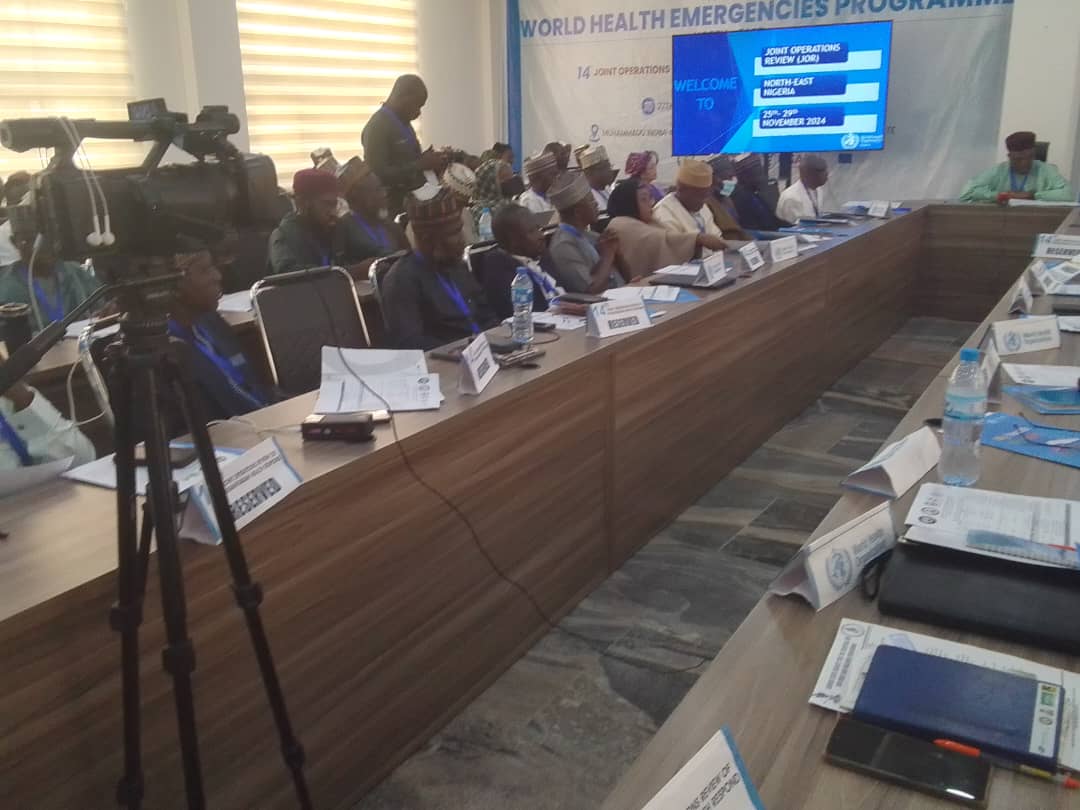Health
WHO Holds Joint Operational Review On Humanitarian Health Response For States Affected By Crisis

|
Getting your Trinity Audio player ready...
|
WHO holds Joint Operational Review on Humanitarian Health Response for states affected by crisis
By Madu Mohammed, Maiduguri
The World Health Organisation (WHO), has convened a 2 days joint Operational Review of Humanitarian Health Response, in crisis ravaged crisis of Adamawa, Borno, Yobe, Benue and Plateau to assess the success, challenges and the way forward.
Speaking at the Joint Operation Review of Humanitarian Health Response, held at the Indimi Centre University of Maiduguri on Wednesday, the Country Director of the WHO, Dr. Kazadi Mulombo said the meeting is to Support the Ministry of Health and other partners in evaluating annual health emergency plans and ongoing operations, assess operational efficiency and effectiveness, examining the integration of various health service delivery platforms..
“The Joint Operational Review aims to review and enhance the humanitarian health emergency response, focusing on identifying lessons learned, challenges, and best practices. We will evaluate progress towards Strengthening health system resilience and emergency preparedness, emphasizing local ownership and stewardship” the country Director said.
He said “Since 2016, the humanitarian crisis in Northeast Nigeria, driven by the Boko Haram insurgency, has caused immense suffering and disruption. The health sector has faced severe challenges, including the destruction of infrastructure, displacement of populations, and increased risk of disease outbreaks.”.
Dr Malumbo said Our goal is to improve health outcomes and service delivery by monitoring trends and assessing the status of health services.Overall, enhance the humanitarian health emergency response, strengthening health system resilience and preparedness, emphasizing local ownership, improve health outcomes by assessing service delivery platforms and operational efficiency, and finally advance the. Humanitarian-Development-Peace Nexus (HDN), fostering multisectoral approaches to challenges.”
While pointing the Specific Objectives JOR, the country Director said ” the JOR is aimed at Conducting a situational analysis to understand the context and its impact on health service delivery, Monitor progress and performance using agreed indicators to track improvements in health outcomes., IIdentify critical gaps and document lessons learned to inform future response phases.”
“This year, about 2 million beneficiaries, representing 54.4% of targeted population are reached by 58 implementing partners (27 in Borno, 25 in Adamawa, 17 in Yobe) in 3 states, 60 LGAs, 411 wards, improving access to quality health services.
Efforts have been made in engaging in the localization, ensuring local organizations and communities are empowered to build the resilience of the health system, ” he added .
He reiterated the commitment of the WHO in ensuring that 25 that Non Governmental Organisations (INGOs) committed 25 percent of funds in providing health care delivery and urged state governments to advocate for that.
The Country Director said, we make a commitment to ensure funding is mobilized, to prepare NGOs to be ready by committing 25% starting from next year and we will put the suitable mechanisms to ensure those NGOs adhere to our standards. We ask the government to advocate for that.
He assured that the WHO and other UN agencies, has proactively mobilized human resources, deploying technical experts to affected states to augment health emergency response capacity, enhance situational analysis, and inform evidence-based decision-making.
In his keynote address, the Yobe state commissioner for Health, Dr Mohammed Gana assured the WHO that the Yobe state government will continue to work with the WHO in improving the health of its citizens.
In their seperate address, the commissioners of health from Borno , Adamawa, Plateau and Benue states thanked the WHO for providing the need leadership to improve the health service delivery in their respective states, especially Emergency public health response.







